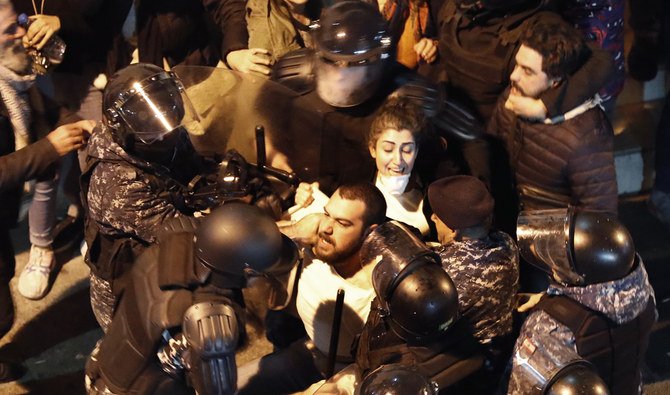
- ARAB NEWS
- 06 Jul 2025

Najia Houssari
BEIRUT: The UN accused Lebanese politicians on Wednesday of standing by while the country descends into chaos, after an overnight rampage by mobs targeting bank buildings in an upmarket area of Beirut.
Security forces fired tear gas outside the central bank to disperse protesters who pelted them with stones and fireworks. One man hurled a car battery at the glass facade of a bank as another hit it with a metal pole. Other smashed security cameras and ATM machines, and wrenched traffic lights and parking meters from the ground.
In five hours of clashes in Hamra, nearly 50 internal security officers and up to 40 protesters were injured, and 59 people were arrested. The violence was the worst since protests against government corruption and financial hardship began in October, and came amid a continuing stalemate and sectarian political squabbling over a new government.
“Another day of confusion around the formation of a government, amid the increasingly angry protests and free-falling economy,” said Jan Kubis, UN special coordinator for Lebanon.
“Politicians, don’t blame the people, blame yourselves for this dangerous chaos.”
As the protest movement nears the start of its fourth month, banks have become a prime target of demonstrators who accuse them with driving Lebanon toward its worst economic crisis since the 1975-1990 civil war.
Banks have arbitrarily capped the amount of dollars customers can withdraw or transfer abroad. Most have limited withdrawals to about $1,000 a month, and others have imposed even tighter curbs.
“I have been coming here for the past three days and could take only $300 ... we are begging, working 55 years to come and beg at the end,” one woman on Hamra Street said ion Wednesday.
Hamra shopkeeper Mohammad Al-Rayyes said: “I was expecting what happened yesterday. Unfortunately the chaos is because of the politicians.
A security guard at Franasbank, who was off duty on Tuesday night, spoke to Arab News as he watched a new surveillance camera being installed outside the bank. “Even if I were here, what could I have done?” he said.
“The security forces could not face them, they had to use tear gas. This is the first time something like this has happened on Hamra Street. Even in the days of the war, banks operated normally and no one attacked them.”
Passers-by were dumbfounded by the scenes. “What happened aims to make the revolution look bad,” said one, Mohammed. “Those who smashed and assaulted public and private property are not peaceful protesters. This is not how we respond to banking restrictions.”
Another woman described the scene as a “battlefield.” She said: “Destroying private property does not benefit the revolution.”
Saad Hariri, who resigned as prime minister when the protests began but remains as a caretaker, said: “The attack on Hamra Street is unacceptable, and a blot on any party or person justifying or masking it.”